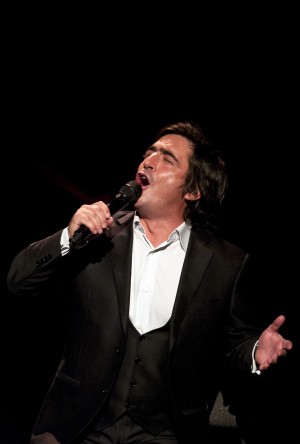Enter Fado: A Flavorful Taste of Portuguese Music
If you don’t know what Fado is, you are probably not alone, but you are missing something wonderful. Last weekend, the Brooklyn Academy of Music went Portuguese with several days of talks and concerts focused on this popular indigenous music form, with both new and venerable practitioners participating.
Fado, which means fate or destiny in Portuguese, is basically a combination of torch song and troubadour, a guitar-based national song style that originated in the 1820s and, like Argentina’s tango, began in the ports. Made internationally famous by superstar Amalia Rodrigues in the 20th century, Fado is being preserved as well as taken in new directions today. Rodrigues became so synonymous with the genre; there was little room for others to flourish. Since she died in 1999, her spirit has been taken up by various new groups and individuals working with their lute-like Portuguese guitars and string basses, and dramatically-garbed singers, male and female. These are songs of love and longing, presented with the performers’ hearts on their sleeves.
Two acts, representing the traditional Fado, were on hand for a full-house crowd at Brooklyn’s BAM theatre; Lisboa Soul and the wonderful singer Camane. Lisboa Soul, a group effort with soloists, was the first onstage, and featured some lively string playing before the singing began. The flavors of North Africa infused with the Hispanic culture are what make Lisboa so intoxicating and mysterious, bringing out the core sentiments of Portugal’s capital. The stylized singing of newcomers like Ritinha Lobo, a kind of Rihanna-esque enchantress, was mixed wonderfully with the Maurice Chevalier-like debonair Rodrigo, a performer who has been involved with Fado for half a century. The quickness of the strings, both in the foreground and background, make you want to dance and clap your hands or, just a slight change of key, could bring you to tears.
The highlight of the evening, however, was the singer Camane, making his United States debut at BAM. Camane comes from a family of “fadistas” and has had top-20 hits in his native Portugal. A small man physically, with dark good looks; his voice took in the entire Gilman Concert Hall with its passionate, evocative range and tones full of yearning. He worked his way through a number of songs and two curtain calls – something rarely seen at BAM, if anywhere.
Dressed in a dark suit and in a single spotlight, Camane constantly moved toward the audience as he sang, and the crowd loved it – at the end of each piece, they jumped to their feet clapping and were usually still clapping before the next song began. He constantly pointed to and thanked his three musicians – one on guitar, one on Portuguese guitar and third on a standing bass – and every time he did, the crowd again, went wild. The sparseness of the stage was in direct contrast to the high emotion of the music and amplified its effect – the one voice in a huge auditorium became the universal voice of love and loss connecting with each eager listener.
“All that I am, I show when I sing,” he has been quoted as saying, “Fado is inside my body, it walks inside my blood, runs through my heart, and comes out in my throat.” He also says that Fado can be an acquired taste. “You have to be ready to let it in; to let it take you over, even if at first you find it strange.”
Fado can be strange to the untrained ear, but even without knowing the words, one is eventually caught up in the emotion. The next stop for the Fado concerts is Boston, with recordings and other acts and events scheduled in Canada and California, among other venues, during the next few months. With the explosion of new voices over the past decade, we should be hearing a lot more about this art form and from a great variety of talented artists.











